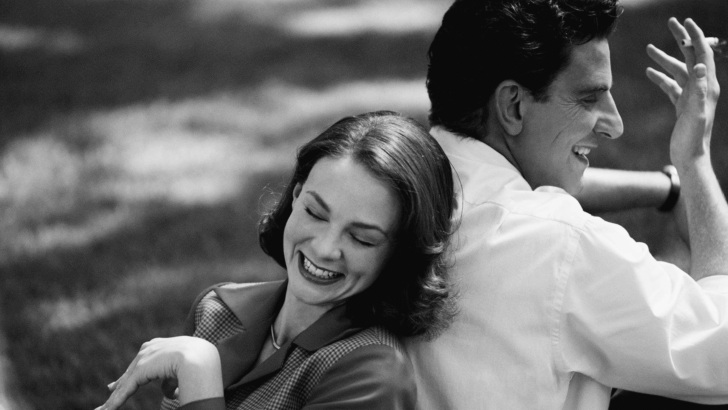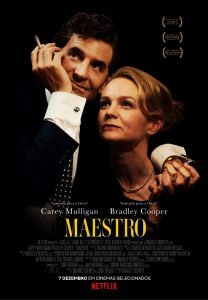Users: 0
“Maestro” is directed by Bradley Cooper to bring to life the complex story of maestro Leonard Bernstein.
Leonard Bernstein (1918-1990) will be for many, including myself, not only one of the greatest American composers, but also one of the most esteemed conductors both by demanding music lovers and by significant segments of the general public, especially from the moment he took over the, let’s say, didactic facet that popularized him as a figurehead of Young People’s Concertsthe concerts for young people recorded in Lincoln Center of New York and exhibited by CBS in the United States between 1962 and 1972 and on a variety of TV channels around the world, more than forty, including RTP from Portugal. Times that are long gone, when classical music benefited from schedules and friendly exposure in the prime-time of the small screen. Today, on the contrary, it seems that we are witnessing a civilizational regression where fancary and the “penetrating” stench of cod predominate.
BACK TO EACH OTHER: THINK OF A NUMBER! TWO, AS A PAIR?
In the opening minutes of the film “Maestro”, 2023, written, directed and performed by Bradley Cooper, we will meet Leonard Bernstein when he was about to benefit from a relative “miracle” that would change his life and his professional destiny, that is, on the threshold of acquiring an enviable status for someone of his age, since in 1957 he was appointed principal conductor of the New York Philharmonic, replacing the Greek Dimitri Mitropoulos (1896-1960). The other event that would change the course of his life, but this time on a personal and private level despite its impact on the public level, was the somewhat fortuitous and far from “miraculous” meeting with a Chilean actress, Felicia Cohn Montealegre (played masterfully in the film by Carey Mulligan), the girlfriend and free woman who later ended up diverting or, at least, curbing the exuberant social life that Leonard Bernstein had experienced in the first years of his career in the intricacies of the arts and letters of big Apple, where he became involved in adventures and romantic relationships with both men and women. However, the two ended up getting married on September 10, 1951.

All this will not be deceived, and thankfully, in the “Maestro”, version Bradley Cooper, assisted in the script by Josh Singer. It should be said that initially the film was scheduled to be directed by Martin Scorsese. But because of the filming of his first fiction feature film for Netflix, “The Irishman” (The Irishman), 2019, the new biographical and musical “bonbon” ended up in the hands of the actor who had already proven his competence by directing the melodrama “A Star Is Born” (This is how a star is born), 2018, a unique story but previously adapted to the big screen. And the least that can be said is that Bradley Cooper does not disappoint in his vision of the maestro, nor his dose of overacting (mitigated but still there) goes against the natural enthusiasm gay (of joyful, not necessarily of sexual orientation) with which the composition of man and his personasomehow justified and supported by the option that the director and actor wanted to take, polarizing the very particular style of behavior, praised and recognized among those who followed and follow, through the audio and visual materials available, the idiosyncratic signs of his public exhibition, that is, the face and attitudes of the true Leonard Bernstein.
Namely when the musician, more than the man, was better noticed, especially in his exuberant performances in front of the orchestras he directed and who with him reached a level of perfection that no one in their right mind would refuse to share as a spectator if they were lucky enough to be able to attend the corresponding concerts. In fact, we can emphasize that “Maestro” gives importance to the world in which these great musical events take place, but a good part of its narrative structure delves more decisively and actively into the contradictions of the couple’s lives, where objectivity and subjectivity mix , in the ups and downs and in the narrow line that separates the fidelity of a love that sometimes burns without being seen and the pure and hard rupture. Two as a pair, yes, but with their backs facing each other.
Twice we will watch this question and answer game between Leonard Bernstein and Felicia Montealegre. Two similar moments that, seen from afar, seem to reveal a happy harmony but that, seen up close, are very different in essence. A first moment in an era of some individual freedom where each person asks for the number that the other was supposed to guess (the number that the partner would be thinking). And a second in an era in which there was no longer any place for any kind of innocence and where the notion of the unity of one plus one being two, as was the assumption of the initially desired equation, had already been lost in the wear and tear of the curves and counter-curves of life in common. This is actually the dramatic conflict that dominates “Maestro” and that in my opinion makes this film a work capable of overcoming the usual limitations of purely biographical projects. Projects where the characters often follow paths that diverge or converge from those shown in the so-called official materials, like someone filming someone wanting to go to a place and, instead of moving forward towards a personal vision, they walk there in circles and more turns until finding the way out of an always intricate drama, a labyrinth of emotions, most of the time manufactured, to make a “win” and please undemanding audiences.

Also noteworthy is the photography direction in black and white and color, signed by Matthew Libatiquein a palette reminiscent of photographic and cinematographic images from the different eras covered, with the intelligent use of ratio classic of the frames that converge our attention to the world and the intimacy of Leonard Bernstein and Felicia Montealegre, characters who created for themselves a universe of their own values that, often, do not protect the family space in itself, a kind of a sanctuary of creation, here and there invaded by the outside that quietly ends up subverting the rules of the behavioral game.
Highlight for the sound and, as expected, for the musical soundtrack where the music of Leonard Bernstein and the music of other composers come together, without however erasing the silences of the soul that are expressed there through a look , a smile or a robust but not gratuitous shattering of the moral conventions of the dominant ideology, the social and political framework that accompanied the lives of the protagonists in the United States, and beyond.
Maestro, the Critic

Movie title: Conductor
Director(s): Bradley Cooper
Actor(s): Carey Mulligan, Bradley Cooper, Matt Bomer, Vincenzo Amato, Greg Hildreth, Michael Urie, Brian Klugman
Genre: Drama, 2023, 129min
Conclusion:
PROS: Not being a simple biopic…!
And also the fact that Bradley Cooper demonstrates that he is ready to move forward with his career as a director, whether he is an actor or not.
AGAINST: And now all that remains is to hope that the usual futility brigade and the gang of silly and superfluous news, give up the puerile exercise that consists, roughly speaking, of looking for similarities or differences between the Leonard Bernstein in the film and the one in real life that perhaps only those closest to you knew in detail, and still go find out. Above all, do not impose on us the idle talk of the controversy about the maestro’s nose and the spiel about the pitfalls associated with the way Jews are represented in cinema and other arts. In fact, there are those who don’t know how to distinguish a fiction project from a simple collection of trading cards.





















